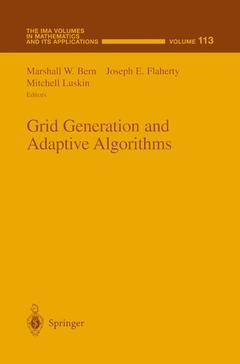Grid Generation and Adaptive Algorithms, Softcover reprint of the original 1st ed. 1999 The IMA Volumes in Mathematics and its Applications Series, Vol. 113
Langue : Anglais
Coordonnateurs : Bern Marshall W., Flaherty Joseph E., Luskin Mitchell

This IMA Volume in Mathematics and its Applications GRID GENERATION AND ADAPTIVE ALGORITHMS is based on the proceedings of a workshop with the same title. The work shop was an integral part of the 1996-97 IMA program on "MATHEMAT ICS IN HIGH-PERFORMANCE COMPUTING. " I would like to thank Marshall Bern (Xerox, Palo Alto Research Cen ter), Joseph E. Flaherty (Department of Computer Science, Rensselaer Polytechnic Institute), and Mitchell Luskin (School of Mathematics, Uni versity of Minnesota), for their excellent work as organizers of the meeting and for editing the proceedings. I also take this opportunity to thank the National Science Founda tion (NSF), Department of Energy (DOE), and the Army Research Office (ARO), whose financial support made the workshop possible. Willard Miller, Jr. , Professor and Director v PREFACE Scientific and engineering computation has become so complex that traditional numerical computation on uniform meshes is generally not pos sible or too expensive. Mesh generation must reflect both the domain geometry and the expected solution characteristics. Meshes should, fur thermore, be related to the solution through computable estimates of dis cretization errors. This, suggests an automatic and adaptive process where an initial mesh is enriched with the goal of computing a solution with prescribed accuracy specifications in an optimal manner. While automatic mesh generation procedures and adaptive strategies are becoming available, major computational challenges remain. Three-dimensional mesh genera tion is still far from automatic.
hp-finite element procedures on non-uniform geometric meshes: Adaptivity and constrained approximation.- Tetrahedral bisection and adaptive finite elements.- Resolution of boundary layers on triangular meshes.- A general concept of adaptivity in finite element methods with applications to problems in fluid and structural mechanics.- A solution based H1 norm triangular mesh quality indicator.- Experiments with repartitioning and load balancing adaptive meshes.- Distributed octree data structures and local refinement method for the parallel solution of three-dimensional conservation laws.- Adaptive finite element methods for elastostatic contact problems.- The full domain partition approach to parallel adaptive refinement.- Adaptive solution of phase change problems over unstructured tetrahedral meshes.
Date de parution : 10-2012
Ouvrage de 189 p.
15.5x23.5 cm
Disponible chez l'éditeur (délai d'approvisionnement : 15 jours).
Prix indicatif 52,74 €
Ajouter au panierThèmes de Grid Generation and Adaptive Algorithms :
© 2024 LAVOISIER S.A.S.
